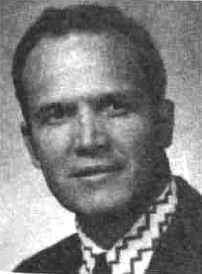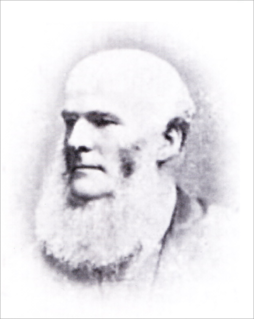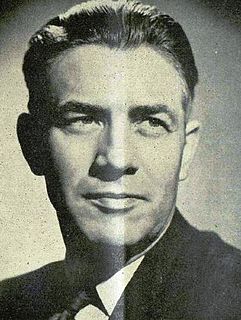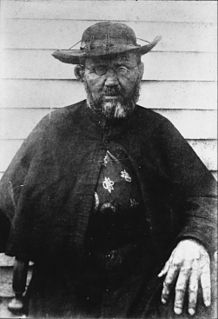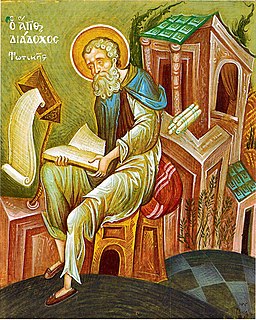A Quote by Pope Francis
"Do you love me?"; "Are you my friend?". The One who scrutinizes hearts (cf. Rom 8:27), makes himself a beggar of love and questions us on the one truly essential issue, a premiss and condition for feeding his sheep, his lambs, his Church. May every ministry be based on this intimacy with the Lord; living from him is the measure of our ecclesial service which is expressed in the readiness to obey, to humble ourselves, as we heard in the Letter to the Philippians, and for the total gift of self.
Quote Topics
Related Quotes
The Lord greatly loves the repenting sinner and mercifully presses him to His bosom: "Where were you, My child? I was waiting a long time for you." The Lord calles all to Himself with the voice of the Gospel, and his voice is heard in all the world: "Come to me, my sheep. I created you, and I love you. My love for you brought Me to earth, and I suffered all things for the sake of your salvation, and I want you all to know my love, and to say, like the apostles on Tabor: Lord, it is good for us to be with You."
Our Lord Jesus Christ made the merciful shepherding of His sheep the proof of love for Himself (cf. Jn. 21:15-17). He denounces as 'wicked' the servant who refused to pardon the debt of his fellow servant and who did not share in even the smallest way, the immense kindness that was bestowed on himself; that he should suffer the fate which he dealt is plainly shown to be right (cf. Mt. 18:32-33).
Mary adored Jesus as the Bridegroom of souls. Union is the final purpose of love. Jesus by the gift of His substance in the Eucharist unites Himself with our souls as with His dear spouses. As a Bridegroom, He gives them all His possessions, His name, His heart, His whole Self, but on the condition that the soul reciprocates. The soul, His spouse, shall live for Him only
I beg Our Lord, Monsieur, that we may be able to die to ourselves in order to rise with Him, that he may be the joy of your heart, the end and soul of your actions, and your glory in heaven. This will come to pass if, from now on, we humble ourselves as He humbled Himself, if we renounce our own satisfaction to follow Him by carrying our little crosses, and if we give our lives willingly, as He gave His, for our neighbor whom He loves so much and whom He wants us to love as ourselves.
May we all be in such a condition of soul, such an attitude of heart as will fit us for any little work in which our gracious Lord may be pleased to use us- not seeking a place for ourselves, but lovingly serving all. The Lord, in His great mercy, grant that thus it may be, with all His beloved people!
How can we feel our need of His help, or our dependence on Him, or our debt to Him, or the nature of His gift to us, unless we know ourselves.... This is why many in this age (and in every age) become infidels, heretics, schismatics, disloyal despisers of the Church.... They have never had experience of His power and love, because they have never known their own weakness and need.
The service a man renders his friend is trivial and selfish, compared with the service he knows his friend stood in readiness to yield him, alike before he had begun to serve his friend, and now also. Compared with that good-will I bear my friend, the benefit it is in my power to render him seems small.
In the first section of the Doctrine and Covenants we read that 'the Lord shall come to recompense unto every man according to his work, and measure to every man according to the measure which he has measured to his fellow man.' (D&C 1:10.) This principle, showing the manner by which God will judge us, puts a new light upon the commandment to love our neighbors as ourselves, and should persuade us to take that law seriously.
Holy love has a way of consuming some. This is what is meant by the one who said, 'You have ravished our hearts' (Sg. Of Sgs. 4:9). And it makes others bright and overjoyed. In this regard it has been said: 'My heart was full of trust and I was helped, and my flesh has revived' (Ps. 27:7). For when the heart is cheerful, the face beams (cf. Prov. 15:13), and a man flooded with the love of God reveals in his body, as if in a mirror, the splendor of his soul, a glory like that of Moses when he came face to face with God (cf. Ex. 34:29-35).
Divine love makes us true to ourselves and to others...
Divine love is the solution to our difficulties and problems.
It frees us from every kind of binding.
It makes us speak truly, think truly, and act truly.
It makes us feel one with the whole universe.
Divine love purifies our hearts and glorifies our being.
At the beginning of the struggle the holy commandments of God must be fulfilled with a certain forcefulness of will (cf. Mt. 11:12); then the Lord, seeing our intention and labour, will grant us readiness of will and gladness in obeying His purposes. For 'it is the Lord who makes ready the will' (Prov. 8:35 LXX), so that we always do what is right joyfully. Then shall we truly feel that 'it is God who energizes in you both the willing and the doing of His purpose' (Phil. 2:13).
Every deviation from the rules of charity and brotherly love, of gentleness and forbearance, of meekness and patience, which our Lord prescribes to his disciples, however it may appear to be founded on an attachment to Him and zeal for His service, is in truth a departure from the religion of Him, "the Son of Man," who "came not to destroy men's lives, but to save them.





